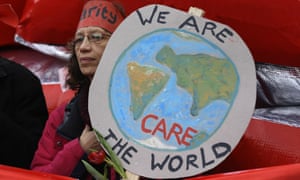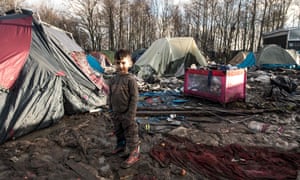Extract from The Guardian
Global warming heads top economists’ concerns
for first time but large-scale forced migration seen as most likely
risk to materialise
A climate activist demonstrates in Paris during
the UN climate change conference in December. This year, global
warming leads the WEF’s Global Risks report. Photograph: Matt
Dunham/AP
Thursday 14 January 2016 20.00 AEDT
A catastrophe caused by climate change is seen as
the biggest potential threat to the global economy in 2016, according
to a survey of 750 experts conducted by the World Economic Forum.
The annual assessment of risks conducted by the
WEF before its annual meeting in Davos on 20-23 January showed that
global warming had catapulted its way to the top of the list of
concerns.
A failure of climate change mitigation and
adaptation was seen as likely to have a bigger impact than the spread
of weapons of mass destruction, water crises, mass involuntary
migration and a severe energy price shock – the first time in the
11 years of the Global Risks report that the environment has been in
first place.
The report, prepared by the WEF in collaboration
with risk specialists Marsh & McLennan and Zurich Insurance
Group, comes a month after the
deal signed in Paris to reduce carbon emissions. The WEF said
evidence was mounting that inter-connections between risks were
becoming stronger. It cited links between climate change and
involuntary migration or international security, noting that these
often had “major and unpredictable impacts”.
Espen Barth Eide, the WEF’s head of geopolitical
affairs, said there was a risk of Europe fragmenting as a result of
“people on the move”.
Speaking at a press conference in London to launch
the report, Eide said: “I am concerned about the continued support
in national politics for keeping Europe together.”
Eide added that if enough countries decided to
pursue a non-integrated approach to coping with migration it would
have “profound effects on Europe’s politics and its economy”,
and would have a knock-on impact on the rest of the world. “If
things unravel at the core, what does it mean in other arts of the
world?”
Cecilia Reyes, Zurich’s chief risk officer,
said: “Climate change is exacerbating more risks than ever before
in terms of water crises, food shortages, constrained economic
growth, weaker societal cohesion and increased security risks.
“Meanwhile, geopolitical instability is exposing
businesses to cancelled projects, revoked licences, interrupted
production, damaged assets and restricted movement of funds across
borders. These political conflicts are in turn making the challenge
of climate change all the more insurmountable – reducing the
potential for political cooperation, as well as diverting resource,
innovation and time away from climate change resilience and
prevention.”
The WEF said the broad range of risks – from
environmental to geopolitical and economic – was unprecedented.
It added that risks appeared to be rising, with
global average surface temperatures increasing by more than 1C over
pre-industrial levels for the first time, and the number of forcibly
displaced people at 59.5 million – almost 50% more than in 1940,
when the second world war was being fought. “Data from the report
appears to support the increased likelihood of risks across the
board, with all 24 of the risks continuously measured since 2014
having increased their likelihood scores in the past three years,”
the WEF said.
A five-year-old Kurdish boy from Iraq at a camp
near Dunkirk, northern France. Involuntary mass migration is likely
to increase, according to the report. Photograph: Philippe
Huguen/AFP/Getty Images
When asked which risk was most likely to
materialise in 2016, respondents chose large-scale involuntary
migration. This follows last
year’s refugee crisis, in which hundreds of thousands of people
arrived in Europe fleeing conflicts in the Middle East and north
Africa.
This was followed by extreme weather events,
climate change, interstate conflict with regional consequences, and
major natural catastrophes.
“Events such as Europe’s refugee crisis and
terrorist attacks have raised global political instability to its
highest level since the cold war,” said John Drzik, president of
Marsh Global Risk and Specialties.
“This is widening the backdrop of uncertainty
against which international firms will increasingly be forced to make
their strategic decisions. The need for business leaders to consider
the implications of these risks on their firm’s footprint,
reputation and supply chain has never been more pressing.”
Drzik said at the press conference: “Most risks
are rising. It’s a riskier world right now.”


No comments:
Post a Comment